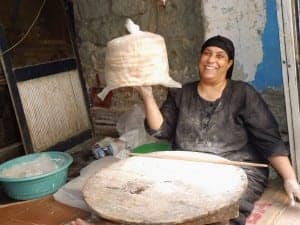Read the Arabic version on the Arabic Microfinance Gateway.
When Women’s World Banking ran a series of focus groups in Egypt last year to assess the demand for health microinsurance, the results were striking. We met with 70 self-employed women and men between the ages of 26 to 55 who were clients of Egyptian microfinance institution Lead to understand their healthcare priorities and obligations and get their reactions to a proposed hospital-cash benefit and a credit life benefit. The research revealed similarities and differences between the way men and women thought and felt about healthcare, and pointed to a way for Women’s World Banking and Lead to design a product that would be meaningful for them.
Caring for one’s health is selfish and takes one away from responsibilities
 Both men and women often did not seek healthcare because it conflicted with their family obligations. Men resisted getting medical treatment or taking time off to go to the hospital because they did not want to miss work. One participant said he has postponed much-needed medical treatment twice, over a month and a half, because “I have work and expenses. I have children at school and many commitments.” Women on the other hand, avoided spending for their health because they thought it was selfish. The women we met were often reluctant to spend a night in the hospital or see a doctor because of their family responsibilities and the costs of treatment. They preferred saving this money for their family. When they give birth in a hospital, they will often go home the next day (or even the same day if they can) to care for other children and family members. A woman who participated in one of the focus groups said: “I cannot spend money on myself and my health when I know that my daughters really need this money. [I will keep going] until I fall down.”
Both men and women often did not seek healthcare because it conflicted with their family obligations. Men resisted getting medical treatment or taking time off to go to the hospital because they did not want to miss work. One participant said he has postponed much-needed medical treatment twice, over a month and a half, because “I have work and expenses. I have children at school and many commitments.” Women on the other hand, avoided spending for their health because they thought it was selfish. The women we met were often reluctant to spend a night in the hospital or see a doctor because of their family responsibilities and the costs of treatment. They preferred saving this money for their family. When they give birth in a hospital, they will often go home the next day (or even the same day if they can) to care for other children and family members. A woman who participated in one of the focus groups said: “I cannot spend money on myself and my health when I know that my daughters really need this money. [I will keep going] until I fall down.”
Caring for one’s health is too costly
The biggest reason for this resistance was the cost of care, even at free public hospitals. This upfront spending does not even cover hidden costs such as transportation, food, medications, bribes to staff, and lost income… all of which add up to an amount that often exceeds clients’ savings, causing them to take out more loans from financial institutions or borrow from friends and family, leading to increased, sometimes insurmountable debt. According to a woman client in the focus group, “we are afraid to go to hospitals because we are usually surprised by the amount of money required. If we are really sick, we need to ask before having any tests or any x-rays, ‘how much money is really needed for this?’”
Caring for one’s health can come down to a choice
Here is where the team found the biggest gender difference: if women had to choose between a health or death benefit, they chose the death benefit because they would rather take care of their children than their own health. As for the men in the focus groups, it was the opposite. They want the health benefit over the death benefit. But many of the focus group participants agreed on one thing: if they were told they could get both benefits, respondents said that that was “amazing.”
Not caring for one’s health can be catastrophic

The insights from these focus groups, combined with additional preliminary qualitative research conducted by Women’s World Banking and Lead, led to the design of a microinsurance product that seeks to address clients’ most pressing health-related financial challenges. Hemaya (“protection” in Arabic) is a benefit that comes with every loan and includes both a hospital cash benefit and a credit life benefit and is similar to the popular Caregiver plan that Women’s World Banking created in Jordan in 2010 in partnership with Microfund for Women, as well as to microinsurance policies that have recently launched in Uganda, Peru, and Morocco. The product is set to pilot in Cairo this month and is offered in partnership with Egyptian Life Takaful Company (GIG).
For Lead’s clients, particularly the women who are reluctant to care for themselves, getting a hospital-cash benefit along with a credit-life policy gives them “permission” to look after their health as well as provide for their families. As one Lead client put it, the program provides “a benefit for me when I’m alive, and for my children if something happens to me.” After kicking off as a pilot program in Cairo this November, Hemaya will be offered in other locations around Egypt in the coming months, with a full rollout slated for next year.



